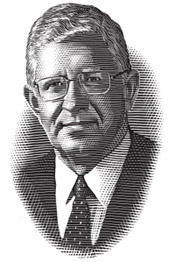|
||
      |
From the President:
Attack by “accountability”
President Don M. Randel sounds the alarm: the battle against reason continues and the loser won’t be only higher education.
 In his Treatise on Tolerance (1763), Voltaire writes, “It
seems as if fanaticism, indignant for some time over the successes of Reason,
were fighting back more furiously.” Such thoughts might occur to one
today. I do not refer to fanaticism from abroad, about which we hear a great
deal, but to fanaticism in the USA—and beyond fanaticism to the large
body of opinion that might be said to be merely resistant to reason.
In his Treatise on Tolerance (1763), Voltaire writes, “It
seems as if fanaticism, indignant for some time over the successes of Reason,
were fighting back more furiously.” Such thoughts might occur to one
today. I do not refer to fanaticism from abroad, about which we hear a great
deal, but to fanaticism in the USA—and beyond fanaticism to the large
body of opinion that might be said to be merely resistant to reason.
The narrow form of this resistance is the assault on science. Intelligent design is not science in any sense, and efforts to impose it on the teaching of science constitute the most egregious example of the assault on science. The year 2005 saw prominent political battles over the teaching of evolution and attempts to oppose evolution with intelligent design, yet the nation’s most prestigious scientific journal, Science, named “Evolution in Action” the breakthrough of the year. Sadly, reason and faith need not be opposed in this way, but that is another matter. Similarly, the controversies surrounding stem-cell research, global warming, and HIV prevention often reflect an unwillingness to come to terms with what our best science at the moment tells us, even if we grant that none of these problems is entirely simple.
The mere inattention to science, however, is just as troubling. The nation is steadily disinvesting in science. In the physical sciences especially, federal spending is flat or declining in real terms. Private-sector spending has plummeted, as the sad fortunes of the once-great laboratories of the Bell companies, General Electric, RCA, and others amply testify. Even in the pharmaceutical industry there is less emphasis on genuinely new science and more emphasis on look-alike drugs that might compensate for expiring patents. But it is scientific prowess that has powered this nation’s economy and assured its worldwide competitiveness. Ignoring this fact puts the nation gravely at risk.
Science’s place in the national consciousness is only part of a larger phenomenon: the assault on, or mere inattention to, the national intellectual life. Naturally, it is the climate surrounding higher education that worries me most.
Higher education is the single most successful enterprise worldwide that the nation has ever engaged in. The global market has spoken, and it demonstrates the superior competitive position of U.S. higher education over that of the country’s airplanes, automobiles, computers, and much else. Yet the nation insists on disinvesting in higher education too, at all levels of government. Only private philanthropy continues to add strength.
Congress, in its newfound zeal for deficit reduction, seems poised to impose budget cuts totalling nearly $50 billion, of which nearly $13 billion will come from student-loan programs. Even if perhaps 30 percent of the reduction will quite appropriately come from subsidies to lenders, the scale of this particular contribution to deficit reduction seems entirely out of proportion.
Despite the demonstrable success of higher education, it has been chosen to have the benefit of a commission, created by the secretary of education, to develop a national strategic plan. The magic word is “accountability.” The commission’s chair advocates standardized examinations for college freshmen and seniors to demonstrate the “outcomes” of their college education. One commission member is an economist who believes that the availability of student-loan funds has enabled colleges and universities to raise tuition. Other members remark on the need to tailor higher education to the requirements of the workforce.
Alumni of Chicago ought to be shocked at the idea that any standardized examination could capture much about the most important aspects of their education or that a national strategic plan would be likely to lead to improvements. Of course, even the University of Chicago must strive to be better, and the nation’s vast higher-education landscape is surely uneven. But I fear that we see the signs of an assault on higher education by people who distrust the life of the mind and who will gladly exploit the national suspicion of precisely the best in higher education. This prospect is tragic in intellectual terms. But in practical and economic terms, it is simply dangerous.